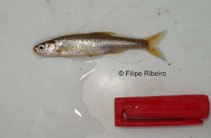Anaecypris hispanica (Steindachner, 1866)
Spanish minnowcarpPictures | Google imageAnaecypris hispanica
Picture by Ribeiro, F.
Classification / Names Common names | Synonyms | Catalog of Fishes(genus, species) | ITIS | CoL | WoRMS | Cloffa
Etymology: Anaecypris: Greek, ana = up + Greek, Cypris = Aphrodite (Ref. 45335).
More on author: Steindachner.
Environment: milieu / climate zone / depth range / distribution range Ecology
Distribution Territories | FAO areas | Ecosystems | Occurrences | Point map | Introductions | Faunafri
Length at first maturity / Size / Weight / Age
Max length : 7.5 cm FL male/unsexed; (Ref. 43324); max. reported age: 3.00 years (Ref. 59043)
Short description Identification keys | Morphology | Morphometrics
Body shape (shape guide): elongated.
Life cycle and mating behavior Maturity | Reproduction | Spawning | Eggs | Fecundity | Larvae
Main reference
Upload your references | References | Coordinator | Collaborators
IUCN Red List Status (Ref. 130435: Version 2025-2)
CITES
Threat to humans
Human uses
More information
Growth parameters
Max. ages / sizes
Length-weight rel.
Length-length rel.
Length-frequencies
Mass conversion
Recruitment
Abundance
Gill area
Brain
Otolith
Body composition
Nutrients
Oxygen consumption
Swimming type
Swimming speed
Visual pigments
Fish sound
Diseases & Parasites
Toxicity (LC50s)
Aquaculture systems
Aquaculture profiles
Strains
Ciguatera cases
Stamps, coins, misc.
Tools
Special reports
Download XML



